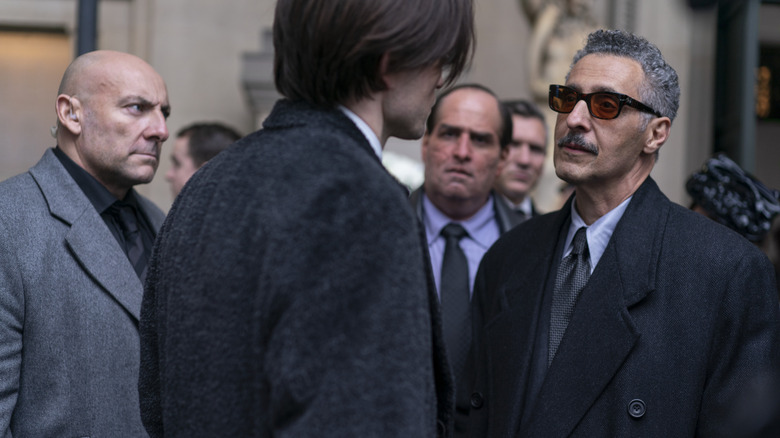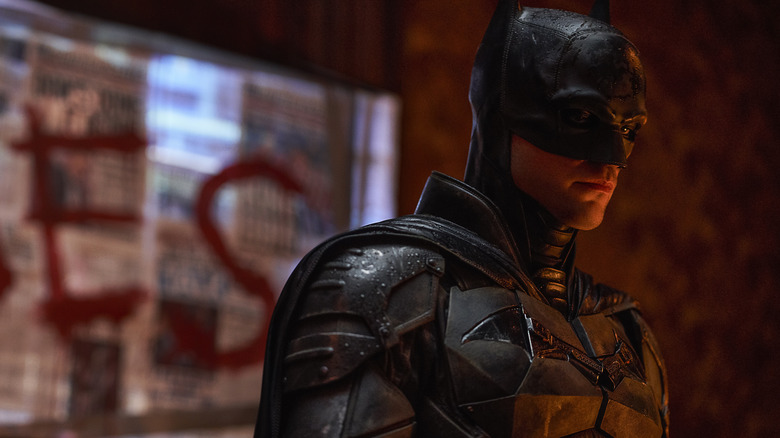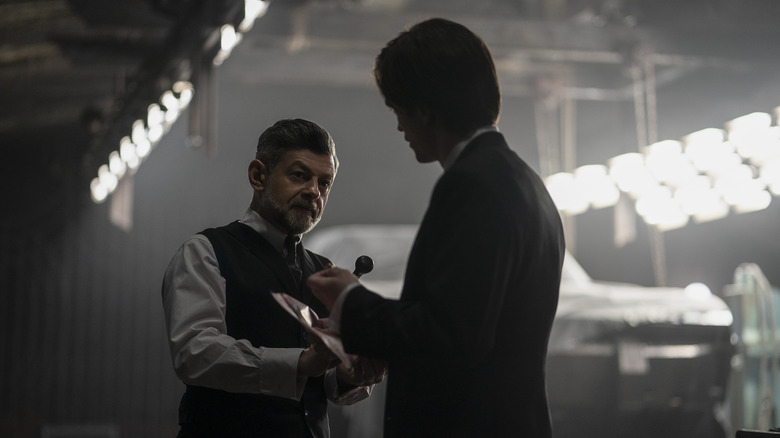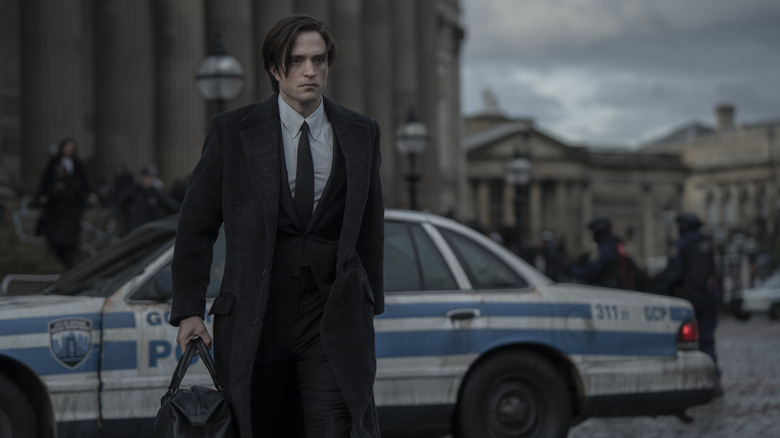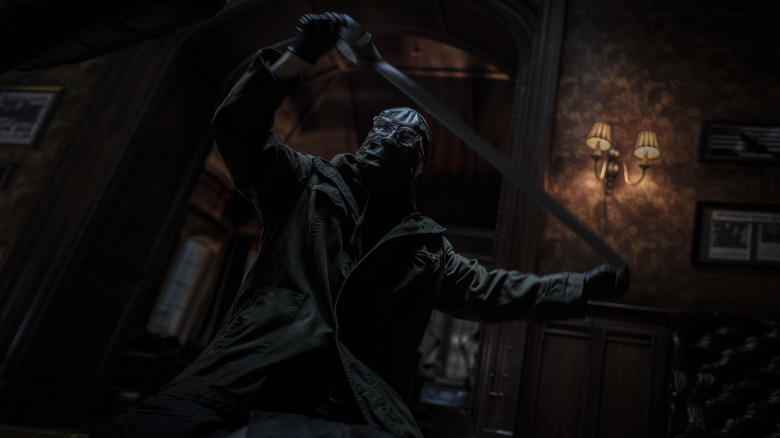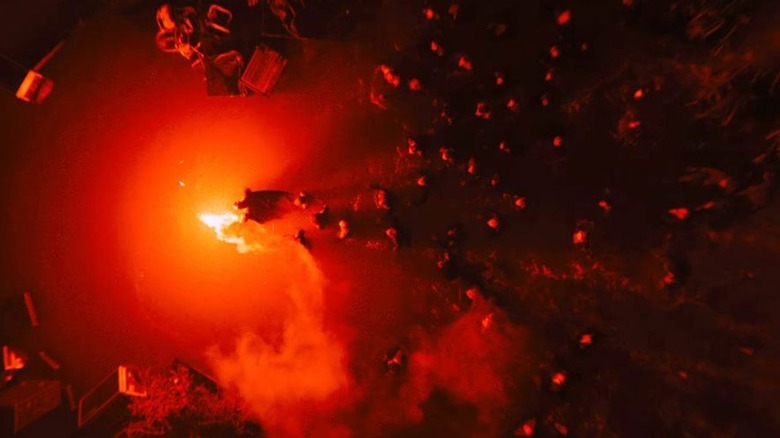The Batman Finally Forces Its Hero To Confront His Own Privilege
Although it's not quite an origin story, "The Batman" is very much about the shaping and development of Bruce Wayne's heroic identity. At the start of the film, Robert Pattinson's Bruce is kind of a misguided creep, and I actually loved this take on Batman precisely for that reason. Throughout the film, we get to see this melodramatic misanthrope gradually step out of the shadows and into the light as he comes to understand the true meaning of justice and heroism. Interestingly, a major catalyst for this journey is the fact that nearly everyone he encounters while donning his Batman persona has mad s*** to talk about Bruce Wayne and rich white guys like him.
If seeing the phrase "rich white guys" is troubling for you, this is your warning that I'll be using other potentially upsetting phrases in the following paragraphs, as I'm diving into the ways "The Batman" forces Bruce Wayne to confront his privilege, reject the dreaded "both sides" fallacy, and become a better ally and true hero in the process. You were warned.
Yes, I know about the comics
In the spirit of addressing people who will undoubtedly point out that Bruce Wayne/Batman is indeed a philanthropist in the comics, let me assure you that I already know. But remember: there are plenty of people who haven't read the comics, or don't know much about the classic hero beyond popular depictions in movies. There's an entire wealth of memes dedicated to humorously pointing out that Batman is a rich guy who beats presumably poor and mentally ill people rather than addressing the systemic issues that led to their becoming villains and criminals in the first place.
Even if this isn't true for every version of the character, we can't really be too angry at the assumption, because it's not like the most well-known and easily accessible depictions of Batman use his philanthropy and humanity as a focal point. With this in mind, "The Batman" makes a point to directly address the common criticism that Batman could remedy the systemic issues that contribute to Gotham's crime problem by using his wealth and influence rather than anonymity and violence.
F**ck Bruce Wayne
Let me preface this by saying that I've been a Batman fan since I was like 5, starting with the campy live-action TV series starring Adam West, and "Batman: The Animated Series." I didn't engage with the "Batman" comics until much later in life, and that's okay, because I'm speaking specifically about "The Batman" movie. In the film, part of Batman's journey to becoming less of a weirdo with infantile views on right and wrong begins when people who have no idea that he's actually the orphaned billionaire and recluse Bruce Wayne begin to talk s*** about Bruce Wayne in his presence.
He doesn't defend himself, partially because it would arouse suspicion, and perhaps partially because he knows they aren't entirely wrong. Sure, he's putting on his high-tech custom gear to fight crime, but how much long-term good is he really doing? His reasons for being Batman at the start of the film aren't even particularly generous or noble. Instead, he's driven by his own desire for vengeance and his extremely limited worldview. He thinks that he alone is the answer to Gotham's crime epidemic, and he doesn't trust anyone. He doesn't stop to think about why people may turn to illegal or less than squeaky clean activities, failing to acknowledge the complexities and nuances of morality and ethics.
An example of this is when he more or less slut-shames Selina Kyle/Catwoman, dismissing her as though she's merely a greedy thief who sleeps around with Gotham's worst criminals in order to gain access to their funds. He is quick to judge her without actually considering the circumstances that pushed her to become a thief, and is clearly very ignorant about the lives of people who weren't lucky enough to be born into the wealth and privilege he willfully ignores. The point isn't that her actions are justified, but that ignoring the cause of the problem doesn't solve anything. At the time, Batman lacked the insight needed to become a more empathetic and effective hero. He failed to see just how much power he wields simply by being Bruce Wayne, to his detriment and the detriment of the city.
Batman's super power is wealth and white privilege
One of the first moments that illustrate how Batman begins to acknowledge this is when he goes back to the nightclub as Bruce Wayne, the rich white guy, rather than Batman, the vigilante. As Bruce, he's welcomed in and immediately given access to the city's most powerful crime lords as opposed to the way he was hassled and denied entry as Batman. This conscious decision to go out and gather information as Bruce Wayne rather than as Batman is the first sign that he's finally understanding the power of his wealth and status — things he neglected and ignored prior, as evidenced by his chat with Alfred at the beginning of the film, during which he declared that he didn't care about his wealth or about being Bruce Wayne.
This neglect also inadvertently contributed to the very same corruption he was fighting against in Gotham as Batman. At one point in the film, it is revealed that the Renewal Fund created by his late father was being abused to bankroll the organized crime that plagued the city. Had he been more willing to acknowledge his own status as Bruce Wayne rather than cosplaying a violent bat, he would have been able to catch the abuse of the Renewal Fund before it got any more out of hand. The money could have been used to help provide Batman's fellow orphans as intended if the now-adult Bruce Wayne had bothered to step up and realize that justice is more than just beating the s*** out of bad guys sooner.
He could have been doing more simply as Bruce Wayne, but he wouldn't listen to Alfred and was too consumed by his own selfish desire for vengeance. It wasn't until Batman was forced to listen to the harsh words of others and face reality in scenarios where he was unable to defend himself or dismiss criticism that he realized this. The lesson he learns through hearing people say many variations of "f*** Bruce Wayne, that rich bastard" is that the best heroes and allies are the ones who show up and use whatever resources at their disposal to do whatever good they can. Up until the third act of the movie Bruce Wayne was not present, and Bruce Wayne has access to spaces and resources that Batman doesn't. Any person in a position of relative privilege who claims to advocate for justice should be using it for good rather than ignoring or denying that they have it. Rather than commit to willful ignorance or engage in the selfish uselessness of feeling guilty, he begins to make changes to use his privilege in a meaningful way.
F*** The Riddler, actually
By the film's end, Batman's resolve to do better after learning this lesson the hard way is revealed in two major scenes. The first one occurs during his confrontation with the Riddler. Not only is it one of the best scenes in the movies thanks to Paul Dano's spectacular performance, but because of Batman's apparent horror and disgust at learning the parallels between himself and the Riddler. Riddler goes on a monologue about how he was one of the orphans who was left behind and abused when Thomas Wayne was murdered. Everyone was too busy focusing on "poor Bruce Wayne" to care about the kids at the orphanage — you know, the ones the Renewal Fund was supposed to help. Without any oversight, the funds were grossly misappropriated, leaving Riddler and other children at the orphanage vulnerable to abuse and poverty, lacking in resources.
The Riddler is a broken human being who became a monster. Sure, he's justifiably bitter and angry about the horrific circumstances that helped to set him down this dark path, but that doesn't excuse his sadistic serial killing and plans to completely destroy the city, even if he was mostly killing corrupt individuals. Unbeknownst to the Riddler, his bitterness and anger are similar to the feelings that drove Bruce Wayne to become Batman, although he still recognizes Batman as a potential ally because they worked in the same way. While Batman doesn't kill people, his idea of justice was characterized by lurking in the shadows and popping out like a ninja to rock people's s***. He hadn't curated an image that would make people feel safe, but rather one of intimidation and fear, so it unfortunately makes sense that the Riddler would pick up on these similarities and enlist Batman to aid in his psychotic crime spree.
This is illustrated at the beginning of the film when Batman saves a man from gang violence. After delivering multiple beatdowns to the gang members with startling technical efficiency, the would-be victim is still terrified — not of the criminals who have scattered to nurse their injuries, but of Batman. The Riddler, who is bats*** insane but still very observant, picked up on this, and was fair in thinking they could be friends. Rather than trying to level or reason with him, Batman/Bruce decides to completely reject the idea that they can ever be associates. It's one thing to acknowledge that people can be driven to illegal activity due to circumstances beyond their control, but it's another to use one's circumstances to justify the sadistic horrors the Riddler engaged in.
I loved that "The Batman" showed the difference between the appropriate time to be understanding and reach across the aisle (helping Catwoman), and the time to say "absolutely the f*** not" and stop letting excuses get in the way of real justice. The Riddler was too far gone and consumed with hatred to reason or level with. He was committed to doing harm, and there's really no negotiating, handholding, or looking the other way when someone crosses that line – particularly when they are unrepentant. In contrast, he's able to keep Selina Kyle from crossing a line by killing, and is able to better understand people in situations far worse than his so that he can help them before they're too far gone.
Finally, Batman is a hero
After his swift and definitive rebuke of the Riddler's hateful ideology and plans, Batman/Bruce Wayne engages in his first real act of selfless heroism towards the film's end. Rather than staying on higher ground when the city is flooded, he makes the decision to literally and figuratively descend from his place of safety and privilege to help the flood victims below. He plunges into the dangerous floodwaters, lights a flare, and leads the people to safety. It's a beautiful scene, both aesthetically and symbolically, and I'm getting teary-eyed just thinking about it. Everything he has learned and experienced concerning privilege, the nuances of justice, and what it really means to be a hero led to this beautiful moment. This point is driven home in the way that the injured woman he carries to safety at the end of the film is unafraid of him, seeing him as a symbol of hope and safety — as opposed to the man he rescued at the beginning of "The Batman," who regarded him with fear and apprehension.
For me, part of the brilliance of "The Batman" is that it cleverly addresses the prevalent criticism that Batman is just a rich white guy who beats up poor people and doesn't work to fight against the root causes of crime in Gotham. The film weaves a narrative through which Batman himself must reckon with that criticism in-world, ending with him choosing to become a real hero in the process. He has undergone gradual, realistic character development to become the most heroic live-action Batman we've seen to date.
Frankly, it would have been a bit too boring and too safe to create a world in which everyone already saw Batman as a hero, so I thoroughly enjoyed the result of the decision to show his maturation into one in a world that initially regarded both of his identities with suspicion and mistrust. It's easy to be kind to people who already like and trust you (or fear you, if they're bad guys); it's far more difficult to earn their trust and acknowledge your own shortcomings in the process. I'm deeply invested in seeing more of this Batman who learns and grows because while I'm not a rich white guy or an orphan, this particular Batman is extremely relatable.
